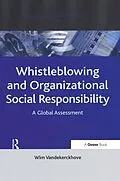Establishing a policy and building a culture that helps to protect organizations from financial wrong-doing, criminal or civil liability and permanent damage to corporate reputation has become a central theme of contemporary corporate policies towards 'whistleblowing'. This book is amongst the first to provide a detailed and full-length analysis of the meaning and various justifications of whistleblowing policies. While the legitimization of organizational whistleblowing suggests an adaptation of organizations to public opinion, this book examines the wider legitimization whistleblowing policies have been given, considering whether the establishment of 'policies' genuinely leads to the implicit institutionalization of whistleblowing itself. The book's particular focus is upon what kinds of 'whistleblowing' societies and organizations actually want, and whether policies developed as a result meet expectations.
Autorentext
Wim Vandekerckhove is a post-doctoral researcher at the Center for Ethics and Value Inquiry (CEVI), Ghent University, Belgium. He researches and teaches in the fields of business ethics, organization ethics, social responsible investment, migration and trafficking, and recently in the field of global ethics. He published chapters in edited books on migration and NGOs and on organization and business ethics, as well as papers in the Journal of Business Ethics and other academic journals. He has edited three journal issues on corporate social responsibility.
Zusammenfassung
Although major breakthroughs in reproductive technology have created dramatic opportunities for many people, they are not without problems. More significant than the question of whether the technologies are "e;good"e; or "e;bad,"e; however, is for whom they are good, in what instances, and to whom they should be made accessible. These issues can be debated at multiple levels; from the ethical implications, to the social and psychological consequences for society and for the individual, to the legal and medical outcomes. Each chapter highlights a different array of problems and benefits, while emphasizing four major themes: the impact of technology on women's lives; the role of women; the individual versus society; and the fetus as patient.
Inhalt
Introduction; 1: Developing Research Questions; 2: Developing the Framework for an Ethical Assessment; 3: Possible Legitimation of Whistleblowing Policies; 4: Screening Whistleblowing Policies; 5: Towards what Legitimation of Whistleblowing?
